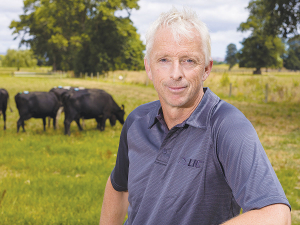2024/25 Dairy Statistics: NZ dairy farmers boost production with fewer cows
According to the New Zealand Dairy Statistics 2024/25 report, New Zealand dairy farmers are achieving more with fewer cows.
 LIC chief scientist Richard Spelman says this cuttingedge technology is another tool to help farmers produce more milk from less cows.
LIC chief scientist Richard Spelman says this cuttingedge technology is another tool to help farmers produce more milk from less cows.
Kiwi farmers can now identify their superior cows before they start milking thanks to a new service provided by LIC.
The co-operative's genomic evaluation service screens an animal's DNA to find out what genes it received from its parents. This provides a more accurate prediction of its expected performance in the milking herd, helping farmers better select their top cows to breed from and increase the rate of genetic gain on farm.
LIC chief scientist Richard Spelman says this cutting-edge technology is another tool to help farmers produce more milk from less cows.
"As New Zealand's cow population containers to reduce, Kiwi farmers are focused on improving the quality and efficiency of their herd. Breeding the best quality heifer (female) calves from the highest genetic merit cows plays a critical role in achieving that."
Spelman says this service allows farmers to get a look into the future and identify their herds' superior performance when they're young calves.
"Traditionally, farmers have to wait a few years until their heifers are milking and have had a couple of herd tests to get a reliable understanding of their performance.
"By drawing on information from an animal's DNA we're able to fasttrack that process and provide farmers with an early indication of their highest genetic merit animals so they can make a concerted effort to breed replacements from them."
Spelman says without genomic evaluation, a parent average is used to predict a calf's performance.
"A parent average isn't the most reliable prediction because it's based on the offspring inheriting an average set of genes from each parent. In reality, they'll have a random mixture of genes from both parents - some will be better and some will be worse.
"Including a calf's DNA in its evaluation provides a much clearer understanding of which genes it's acquired from its mum and dad so we can better predict how well it's going to perform. For a dairy cow, performance is measured by how efficient it is at converting feed into profit."
LIC uses the same technology to select elite young bulls for its breeding programme.
Spelman says the co-op's 30-year investment to develop and fine-tune genomic science, along with its recent purchase of advanced DNA technology, means it's now able to offer this service to farmers.
"LIC has made a significant investment into genomics because we passionately believe in its power to enhance herd improvement. We see the value our genomics investment is delivering to farmers through our high BW bull teams and we're excited to provide shareholders additional value from our investment through this new service," says Spelman.
LIC is able to produce a genomic evaluation using the same animal tissue sample farmers provide for DNA parentage testing.
The sale of Fonterra’s global consumer and related businesses is expected to be completed within two months.
Fonterra is boosting its butter production capacity to meet growing demand.
For the most part, dairy farmers in the Waikato, Bay of Plenty, Tairawhiti and the Manawatu appear to have not been too badly affected by recent storms across the upper North Island.
South Island dairy production is up on last year despite an unusually wet, dull and stormy summer, says DairyNZ lower South Island regional manager Jared Stockman.
Following a side-by-side rolling into a gully, Safer Farms has issued a new Safety Alert.
Coming in at a year-end total at 3088 units, a rise of around 10% over the 2806 total for 2024, the signs are that the New Zealand farm machinery industry is turning the corner after a difficult couple of years.
OPINION: Media reports say global recalls tied to cereulide toxin contamination in milk-based nutrition brands could inflict combined financial losses…
OPINION: It's a case of a dairy company coming to the rescue of a failed plant-based dairy player.